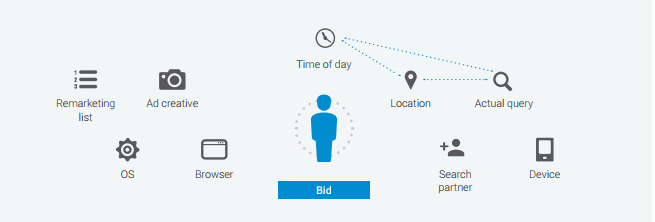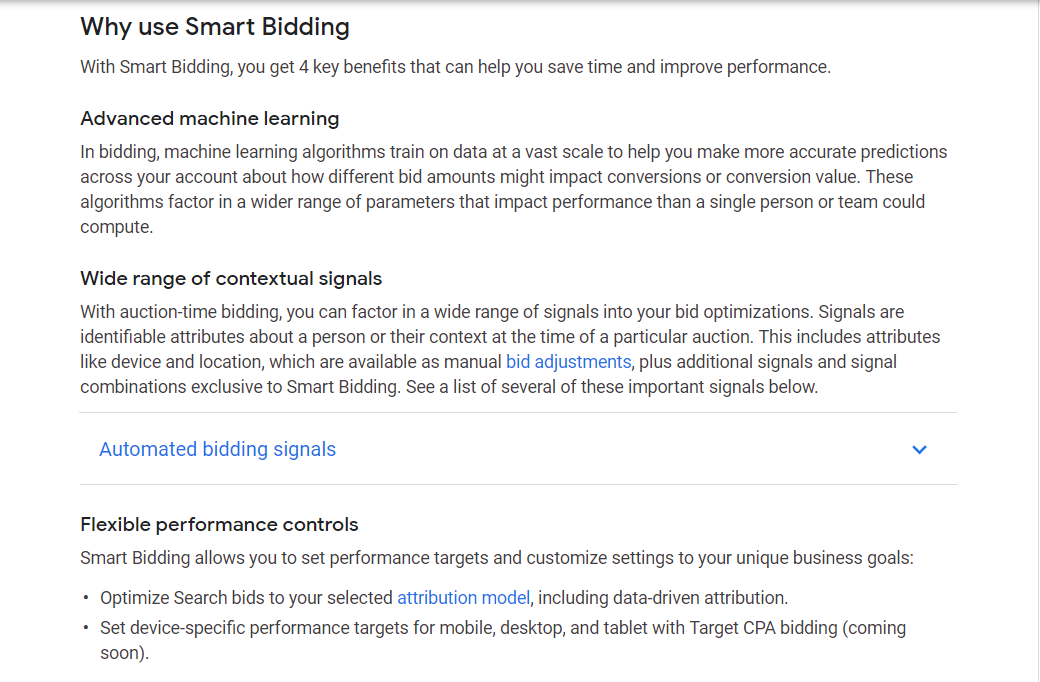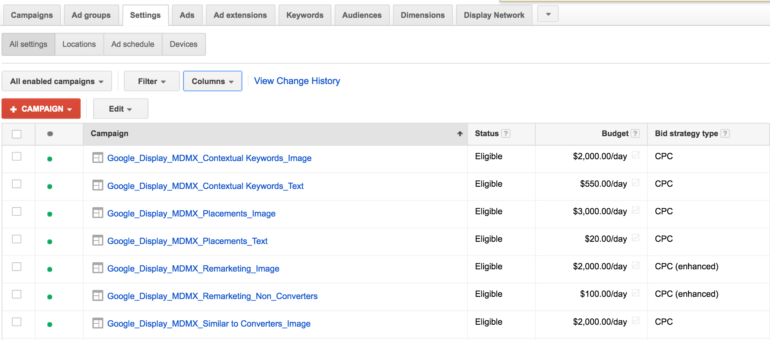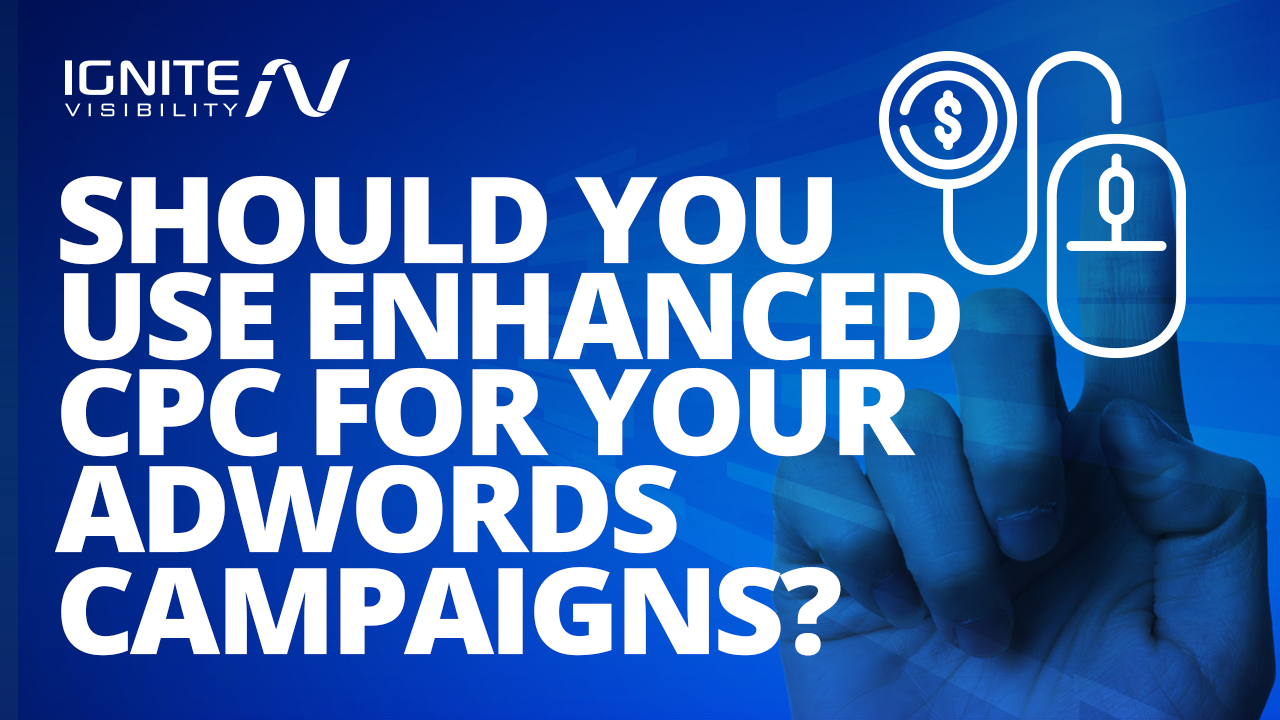How exactly does Enhanced CPC (ECPC) work?
By the end of this post, you’ll know all the details … and whether it’s a good way to bid on Google Ads (Adwords) for your business.
What We’ll Cover:
- How It Works for Google Ads
- Smart Bidding versus manual CPC
- Review a case study example
- Is it more cost-efficient?
- Is Enhanced CPC good for customers?
- Is it a good fit for your business?
- Enhanced CPC versus manual CPC
- How to choose a Google Ads strategy
Let’s start with the basics.
Enhanced CPC (ECPC) is a type of marketing automation for Google Ads, which includes AdWords, video, the Google Display Network and more. Using it, Google automatically manages your advertising bids on all those platforms so you don’t have to.
Convenient, right?
On the other hand, there are marketers who prefer manual CPC versus Enhanced CPC. They think it’s dangerous to turn the whole bidding process over to an algorithm owned by the very same company that’s charging you for ads.
So who’s right? As always, that depends on your unique business and your ad strategy. In this article, we’ll help you decide by breaking down its pros and cons.
How Enhanced CPC (ECPC) for Google Ads Works
Enhanced CPC stands for Enhanced cost-per-click.
It works by automatically adjusting your bids for clicks that are likely to result in sales.

Enhanced CPC
In other words, if Google Ads determines that you’re bidding too low for a well-performing ad, it will up the bid so that you get more conversions. It does that by raising your max CPC bid.
You read that right. Google Ads will increase your max bid by to 30% so that you can win the ad space you want, and earn more sales.
The problem? Obviously, more conversions are a good thing. But not if they come at a price that wipes out your profit margin.
There’s another side to that coin, though. For ads that are less likely to convert, Google Ads will lower the bids so that you don’t waste money.
In fact, the bidding can drop all the way down to $0 for underperforming ads.
So the choice between Enhanced CPC versus manual CPC really comes down to a risk/reward analysis.
Can you afford a potential bump in your ad spend? And will you get enough return on ad spend (ROAS) to justify the spend?
Before you make a final decision, let’s take a look at how Google Ads make decisions for ECPC: the Smart Bidding algorithm.
Smart Bidding & Enhanced CPC (ECPC) vs. Manual CPC
So how, exactly, does Google Ads (Adwords) determine whether or not it should raise or lower your bid? It uses a form of Smart Bidding that relies on market signals, such as the browser location, user demographics, and time of day.
But that’s only part of the story. Google won’t reveal everything that it uses in its algorithm. But, we do know that your ad buying history plays an essential part.

Smart Bidding
Before you can start using Enhanced CPC, you have to have a history on Google Ads. That means you must have at least 15 conversions (that’s clicks from potential customers) in your campaign.
Why? So that Google Ads will have enough data to make adjustments to your bid. Otherwise, the system would simply be shooting in the dark.
Of course, you’ll also need to have conversion tracking turned on. That’s how Google Ads will determine which type of people are likely to convert.
Keep in mind: the larger the sample size, the more likely it is that Google Ads will have accurate data. In this case, bigger really is better.
Are you starting to see a pattern here? It works best for brands which already have a big audience – as well as a generous ad budget.
An Enhanced CPC Bidding Strategy Case Study
Let’s consider an example.
Suppose you’re selling tripods online and you’re running a Google Ads campaign to appeal to professional photographers. You set your max bid to $1 per click and choose Enhanced CPC.
The Google Ads algorithm notices an auction where your ad is likely to perform well. However, the minimum bid to qualify for that auction is $1.50 per click.
Google Ads will ignore your max bid of $1 per click and boot your bid up to $1.60 to ensure that your ad makes it into the rotation.
Your ad shows up, people click on it, and some of them buy your tripods. You’ve just earned more revenue for your business. In fact, in one small study, this tactic improved the return on ROAS for 70% of users.

Enhanced CPC
Is It More Cost-Efficient?
So Google Ads just jacked up your bid to $1.60 and earned you more sales. Many other businesses have seen their conversion number numbers go up too. That’s a good thing, right?
Not necessarily.
You might have earned more revenue, but that doesn’t mean you’ve earned more profit. If your advertising costs go up 60% (the cost per click in this case), can your profit margins sustain that hit?
For many businesses, they can’t. That’s one of the downsides.
Is It Good for Customers?
For some newer businesses, though, the additional charge might be worth it. That’s because they’re still acquiring customers who could generate a long-term revenue stream.
Think about it. If professional photographers visit your site, buy your tripods, and order more of them from your company over their professional careers, was that worth the additional charge?
For many businesses, yes. That’s a long-term outlook, though. So you’ll need a long term strategy to keep those customers engaged, as well as financial reserves while you wait for the investment to pay off.
But whatever your business looks like, don’t forget: ECPC has to be part of a broader, fully optimized Google Ads strategy. You can’t just turn on the autopilot and expect everything to work out.
Can Established Companies Benefit from Enhanced CPC vs Manual CPC?
But what about established companies that are using online advertising to sell more products? Can they benefit from ECPC?
In some cases, yes.
But here’s a trade secret for you. The general consensus among digital strategists is that it’s best to use manual bidding.
Why? One word: control.
When you use manual bidding, you have more control over how much you spend every month. You can use your spreadsheet to run various “what if” scenarios and determine your profit margin.
It’s much more difficult to play “what if” with ECPC. That’s because you’re not sure what the Google Ads algorithm is going to set for your max bid.
You could find that your advertising costs spiral out of control while you get very little (or nothing) in return. Or you could find that your ads cost way less than expected in March, but burned through twice the budget in April.
With manual CPC bidding, your costs are predictable and consistent. If you want to mix things up, you can always test different bids to see where your sweet spot is. You don’t have to rely on an algorithm to find just the right bid.
Bottom line: if you don’t have much history with Google Ads or need to budget every last cent, then don’t use Enhanced CPC. Go with manual bidding instead.
It’s More Simplistic Than Manual Bidding
There’s another reason why you might want to avoid Enhanced CPC. It makes marketing too easy.
“What does that mean?” you might be asking. The easier the better … right?
If you’re letting Google Ads adjust your bids to land more customers, then you’re not targeting specific segments within your market. You’re just letting Google Ads find you more clicks. That’s about ad placement – not getting to know your audience.
As a result, your sales could be much better if you were running tailor-made ads to specific groups of people in your target market.
For example: let’s say that female photographers who specialize in food photography prefer your tripods more than anybody else.
Which of these advertising options do you think would be more effective at reaching that audience:
- A generic ad to all photographers with Enhanced CPC; or
- An ad that appeals to female photographers who are into food photography.
Hopefully, you chose #2.
Unfortunately, though, lots of marketers let ECPC “punt” for them when it comes to good advertising. They place all their faith in the bidding mechanism and don’t look at their targeting practices.
Of course, you could also use option #2 above with Enhanced CPC. But keep in mind, your market segment is already very well defined and you know what you need to bid to stay competitive. If your overall Quality Score is great, you shouldn’t have any problem landing clicks and conversions with manual bidding.
FAQs
1. What is enhanced CPC?
Enhanced CPC, also known as ECPC, is a bid strategy which helps to maximize conversions and their value by adjusting your cost per click.
A perk of ECPC is that it will try to keep your average CPC below the max CPC you set when optimizing for conversions.
2. Should I use enhanced CPC?
Using an Enhanced CPC bid strategy could be extremely beneficial. Enhanced CPC gives you the control of setting your bids manually and the benefits of Google Ads Smart Bidding, which will optimize your bids for conversions.
It is a more hands off option if you’d like to check on your ads on a weekly basis as opposed to on the daily.
Wrapping Up
Enhanced CPC might seem like a great idea, but you need to be sure that it works for your brand. In this post, we’ve covered some key factors for you to consider:
- How much space is there in your ad budget?
- Do you have an established history of using Google Ads?
- How much time do you have to monitor, analyze and adjust your ad campaigns.
- Which is more important to you: ad placement, or reaching a specific audience segment?
- Is this a brief ad campaign, or part of a long term customer engagement strategy?
For more marketers, manual bidding is usually more effective. But there’s no hard-and-fast rule. Conduct your own experiments and see what works best for your brand.

